Towards Universal Bioethics
- In search of the respect for human dignity and human rights -
The progress of life sciences is one of the leading phenomena of the 21st Century. It represents at the same time a victory for human intelligence and a grave challenge for human life. The concept of the life of human beings comes to question through tremendous advancements of life sciences and bio-medical and, in particular, gene technology. "Is Humanity in progress?" Such was the question set by an eminent professor of international law in 1947. "Yes!" certainly. We know how much medical and pharmaceutical developments have contributed to our struggle against various difficulties in human health. However, today, the question should be "Isn't Humanity becoming the prey of scientific progress?". Indeed, the more the scientific advances we realize, the more the life of human beings recedes from nature, and the more arises the questions of life. Manipulation of human life, commercialization of the human body, instrumentalization of the human person; these labels are used so as to show the ethical stakes of biomedical science and technology.

Prof. Ida has served as on
UNESCO's IBC since 1996 and
was appointed Chairperson
in 1997. He was awarded Palmes
Academiques by the French
Government in November 2001
for his achievements.
A couple, formerly diagnosed sterile, has today possibilities to have a child with procreative assistance. An embryo is now possible to be tested in a pre-implantation stage, in order to find genetic difficulties, and then possibly in order to be selected. A young man, apparently in good health, is susceptible to be diagnosed as having Huntington disease through genetic testing. A child, lacking in the adenosine deaminase (ADA) that is indispensable for survival, would be treated with genetic therapy. The genetic data of each individual will result in the so-called individualized medicine, while it might be abusively used for discrimination. Human embryonic stem (ES) cells, derived through destruction of the embryo that has potential of life, are expected to give rise to regenerative medicine. The application of cloning technique to humans is on the edge of two slopes; to produce a so-called "cloned baby", or to obtain an efficient regenerative medicine using stem cells derived from a cloned embryo.
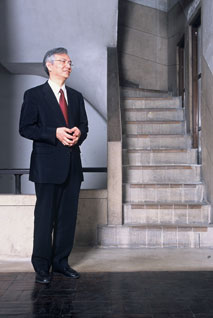
Prof. Ida's office is in the Law Building,
an older buildingwith a special atmosphere.
These are only examples of the results of research and application of today's life sciences. They show us how much the distinction is now vague in our society between life and death, between the normal and the abnormal, between the just and the unjust. Facing these new factors of life, what we are pursuing is human dignity and its corollary, which is the respect for human rights.
Forming principles and guidelines for bioethics based on these two key concepts is an urgent task in this contemporary world. Generating discussions, drafting instruments and applying principles and norms both at the international and national levels are done on the basis of the knowledge and understanding of international law (Prof. Ida is teaching international law and organizations). International bioethics is a kind of "applied international legal studies": bioethics is a field both of reflection on the value of human life and of application to the practical sphere.
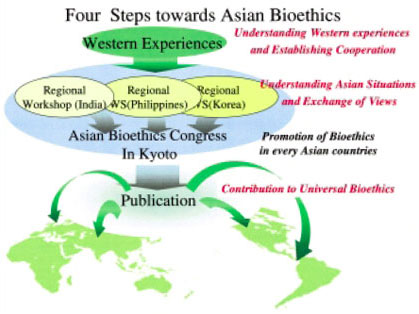
My main contribution is the work on the International Bioethics Committee (IBC) of UNESCO. The Universal Declaration on the Human Genome and Human Rights is the greatest contribution of the IBC and the first on universal bioethics. We should not forget IBC's other precious reports on cutting-edge issues, such as human ES cells or intellectual properties relating to human genome research. Drafting a new declaration on genetic data and consideration of a universal instrument for bioethics are currently the main assignments there. If being the chairpersonship of the IBC since 1998 is a heavy burden for a researcher of international law, the goal is always the same for international law and bioethics. Both are social norms for promoting the values and the welfare of humanity and of each individual. "A new perspective for international law", one might dare say.
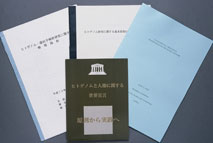
The booklets on the Universal Declaration
and the Basic Principles of which Prof.
Ida was involved in the adoption and the draft.
Upon such conviction, my research and contributions to the practice are currently done in various domains. Besides my participation in the IBC, the research project of a multidisciplinary team into "Dialogues and Promotion on Bioethics in Asia" is a large international project of three years that commenced in 2001. Supported by Ministry of Education, Culture, Sports, Science and Technology (MEXT) from its fund for promotion and coordination of science and technology, it will end with an Asian Conference on Bioethics in Kyoto in 2003. While the ultimate aim of this project is to enable the Asian values on human life to be understood and reflected in universal bioethics, we are trying first to expand reflections on bioethics among Asian countries and peoples, and to understand mutually the problems we have in each Asian nation in this field. Also significant is my contribution to the bioethical norm making and application at national level, such as at the Bioethics Investigation Panel of the Council for Science and Technology Policy as well as at the Special Committee on ES Cells Research.
Our approach might be characterized as a combined theory and practice approach. We are hoping to discover a new dimension in research into social science.
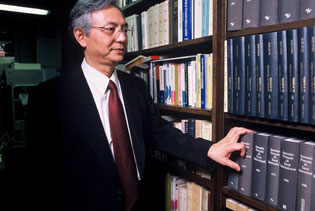
Prof. Ida's office with a number of precious books.
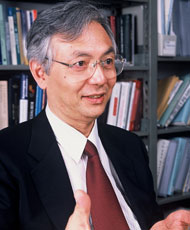
Ryuichi Ida
Born in 1948.
Graduate of the doctoral program, GraduateSchool of Law, Kyoto University
LL.B. and LL.M., Kyoto University, D.E.A., France
Professor, Graduate School of Law, KyotoUniversity
Chairperson, International Bioethics Committee, UNESCO
URL http://www.law.kyoto-u.ac.jp/ida (External Link)
"I find the same values in bioethics and international law, so being involved with both suits me nicely and feels natural."
Listening to Prof. Ida speak in his eloquent, calm way one senses the reality of one of his own comments: "The formation of bioethics is a process of persuasion." He serves as an advocate for causes he believes in by encouraging the participation of ordinary citizens in debates. That is because they originally donated tissue samples for research on the human genome and should therefore reap the benefits of that project. In addition, with regard to the Universal Declaration on the Human Genome and Human Rights (as adopted in 1997), Prof. Ida feels that it represents "minimum common principles shared by all humankind" and refuses to compromise on his stance that the diversity of human values must be respected. He feels that what is needed is the establishment of a mature relationship between scientists and the general public. As a student in France 30 years ago he visited the old battlefields of two world wars. This was the origin of his determination to study international law. Today he is actively working too as a consensus builder in the hope of building stronger connections between cutting edge scientific research and human happiness.

